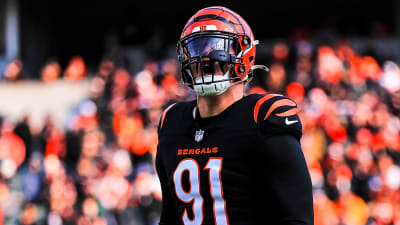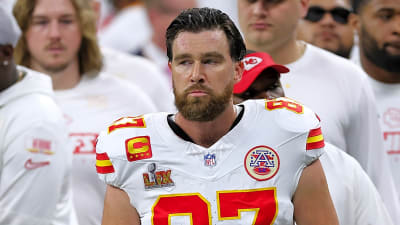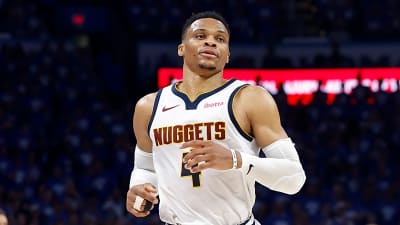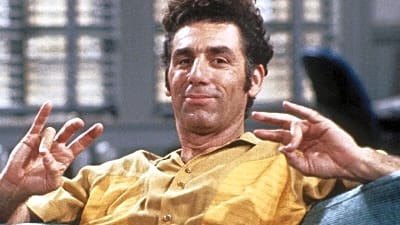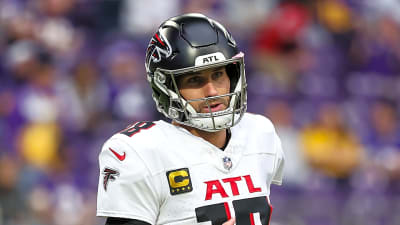- Home
- Quizzes
- My Quiz Activity
- Newsletters
- MY FAVORITES
- Add Sports/Teams
- SPORTS
-
NFL
- NFL Home
- Arizona Cardinals
- Atlanta Falcons
- Baltimore Ravens
- Buffalo Bills
- Carolina Panthers
- Chicago Bears
- Cincinnati Bengals
- Cleveland Browns
- Dallas Cowboys
- Denver Broncos
- Detroit Lions
- Green Bay Packers
- Houston Texans
- Indianapolis Colts
- Jacksonville Jaguars
- Kansas City Chiefs
- Las Vegas Raiders
- Los Angeles Chargers
- Los Angeles Rams
- Miami Dolphins
- Minnesota Vikings
- New England Patriots
- New Orleans Saints
- New York Jets
- New York Giants
- Philadelphia Eagles
- Pittsburgh Steelers
- San Francisco 49ers
- Seattle Seahawks
- Tampa Bay Buccaneers
- Tennessee Titans
- Washington Commanders
-
MLB
- MLB Home
- Athletics
- Arizona Diamondbacks
- Atlanta Braves
- Baltimore Orioles
- Boston Red Sox
- Chicago White Sox
- Chicago Cubs
- Cincinnati Reds
- Cleveland Guardians
- Colorado Rockies
- Detroit Tigers
- Houston Astros
- Kansas City Royals
- Los Angeles Angels
- Los Angeles Dodgers
- Miami Marlins
- Milwaukee Brewers
- Minnesota Twins
- New York Yankees
- New York Mets
- Philadelphia Phillies
- Pittsburgh Pirates
- San Diego Padres
- San Francisco Giants
- Seattle Mariners
- St. Louis Cardinals
- Tampa Bay Rays
- Texas Rangers
- Toronto Blue Jays
- Washington Nationals
-
NBA
- NBA Home
- Atlanta Hawks
- Boston Celtics
- Brooklyn Nets
- Charlotte Hornets
- Chicago Bulls
- Cleveland Cavaliers
- Dallas Mavericks
- Denver Nuggets
- Detroit Pistons
- Golden State Warriors
- Houston Rockets
- Indiana Pacers
- Los Angeles Clippers
- Los Angeles Lakers
- Memphis Grizzlies
- Miami Heat
- Milwaukee Bucks
- Minnesota Timberwolves
- New Orleans Pelicans
- New York Knicks
- Oklahoma City Thunder
- Orlando Magic
- Philadelphia 76ers
- Phoenix Suns
- Portland Trail Blazers
- Sacramento Kings
- San Antonio Spurs
- Toronto Raptors
- Utah Jazz
- Washington Wizards
-
NHL
- NHL Home
- Anaheim Ducks
- Boston Bruins
- Buffalo Sabres
- Calgary Flames
- Carolina Hurricanes
- Chicago Blackhawks
- Colorado Avalanche
- Columbus Blue Jackets
- Dallas Stars
- Detroit Red Wings
- Edmonton Oilers
- Florida Panthers
- Los Angeles Kings
- Minnesota Wild
- Montreal Canadiens
- Nashville Predators
- New Jersey Devils
- New York Islanders
- New York Rangers
- Ottawa Senators
- Philadelphia Flyers
- Pittsburgh Penguins
- San Jose Sharks
- Seattle Kraken
- St. Louis Blues
- Tampa Bay Lightning
- Toronto Maple Leafs
- Utah Mammoth
- Vancouver Canucks
- Vegas Golden Knights
- Washington Capitals
- Winnipeg Jets
- NCAAF
- NCAAM
- Olympics
- Boxing
- Entertainment
- Lifestyle
- Golf
- MMA
- Soccer
- Tennis
- Wrestling
- Sports Betting
- More Sports
- RESOURCES
- My Account
- YB on Facebook
- YB on Twitter
- YB on Flipboard
- Contact Us
- Privacy Policy
- Terms of Service

The top five postseason performances for each MLB playoff team
When it comes to Major League Baseball history, more often than not, legends are made in October. Whether it be a singular play or an unforgettable series, forever is etched in what happens along the path to capturing the pennant. It might be a memorable moment in a career or a standout part of a legendary resume for a Hall of Famer, but every club in the 2019 MLB postseason has a legend of the fall among its ranks. As such, here’s a look at the greatest postseason performances — series or games — for each 2019 participant.
Atlanta Braves: Hank Aaron, 1957 World Series
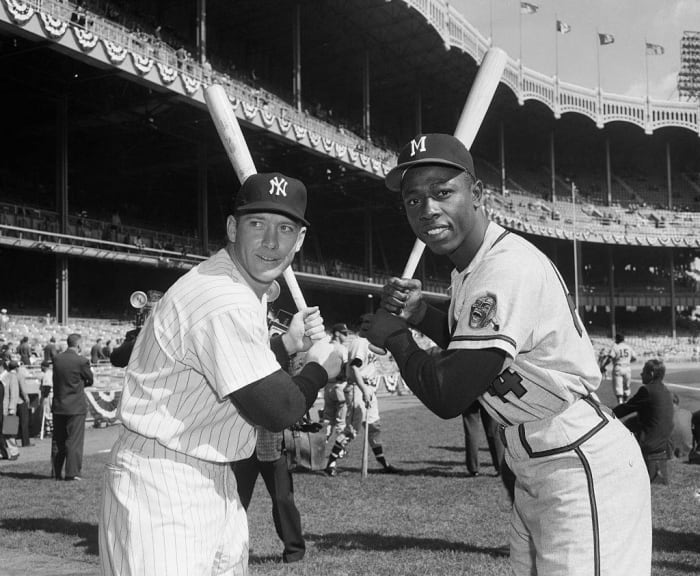
Aaron, a .362 career postseason hitter, made an impact upon arrival in his first World Series. He hit .393 with three home runs and drove in seven runs, following his first (and only) MVP season. The Braves beat the defending champion New York Yankees in seven games, with Aaron posting four multi-hit games.
Atlanta Braves: Tom Glavine, 1995 World Series
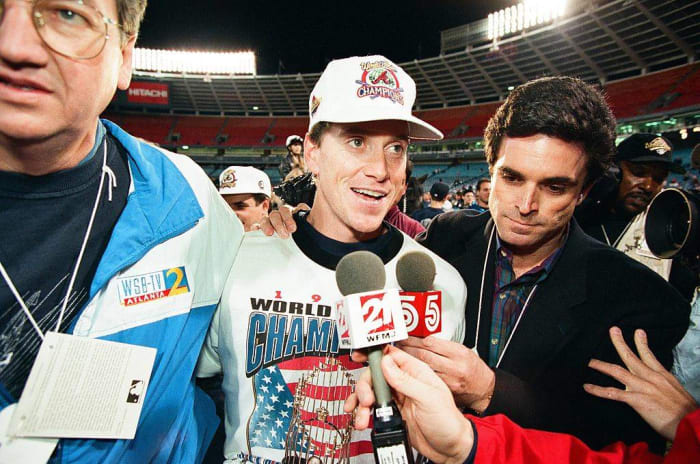
Glavine had a pair of dominant performances against the Cleveland Indians in the 1995 World Series, posting victories in Games 2 and 6. In the decisive Game 6, Glavine worked eight scoreless innings, holding the Indians to one hit (including five no-hit innings to open the game). The Braves won the game, 1-0, with Glavine winning World Series MVP, capturing their lone pennant in six appearances during the decade.
Atlanta Braves: Chipper chases down Cards, 1996

Atlanta went down three games to one during the 1996 NLCS against the St. Louis Cardinals. However, Chipper Jones remained locked in, hitting .440 during the series (11-for-25), and he scored six runs. Jones drove in three runs in the pivotal Game 5 and had four multi-hit games.
Atlanta Braves: Young Andruw Jones arrives, 1996
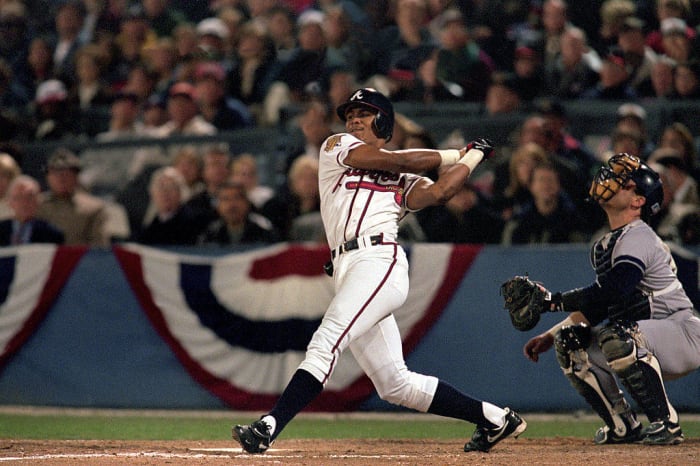
At just 19 years old, Jones became the youngest player in history to hit a homer in a World Series game, doing so in his first at-bat. After homering again his next time up, he furthered his precocious power posting, becoming the second player in history to go deep in his first two World Series at-bats. Overall, Jones hit .400 in his World Series debut.
Atlanta Braves: John Smoltz, 1996 postseason
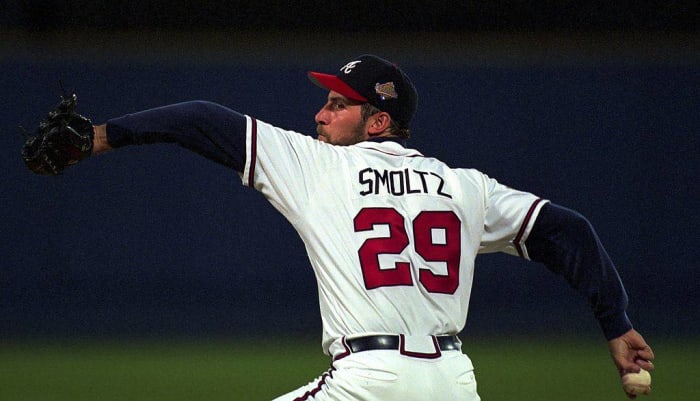
With 15 career postseason wins, Smoltz must be included on the short list of greatest postseason pitchers of all time. He was at his best during the 1996 playoffs when over five starts, he went 4-1 with an 0.95 ERA (four earned runs over 38 innings) while holding the Dodgers, Cardinals and Yankee hitters to a .163 average against him. His only loss came in Game 5 of the World Series when he allowed one unearned run over eight innings of a 1-0 loss.
Houston Astros: Carlos Beltran, 2004 NLCS
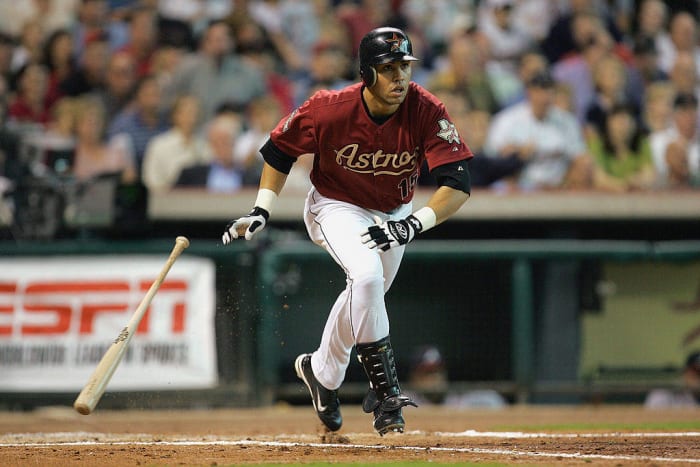
In his first taste of October baseball in his career, Beltran embarked on one of the greatest postseason tears of all time. He hit a home run in each of the first four games of the NLCS against the Cardinals, a series the Astros ended up losing. But Beltran hit eight playoff home runs, tying the all-time single season record and setting a new record with homers in five consecutive games. Overall in the postseason, Beltran hit .434 over 46 at-bats, scored 21 runs and drove in 14.
Houston Astros: Dallas Keuchel, 2015 AL wild-card game

A year after losing 90-plus games for the fourth consecutive year, the Astros resurrected themselves and earned an AL wild-card game berth. On the heels of a breakout season that would eventually lead to an AL Cy Young Award, Keuchel took the ball for the upstart Astros on the road at Yankee Stadium. He held New York to three hits over six shutout innings, setting the table for a 3-0 Houston victory, its first postseason win as an American League team.
Houston Astros: Jose Altuve, 2017 ALDS Game 1
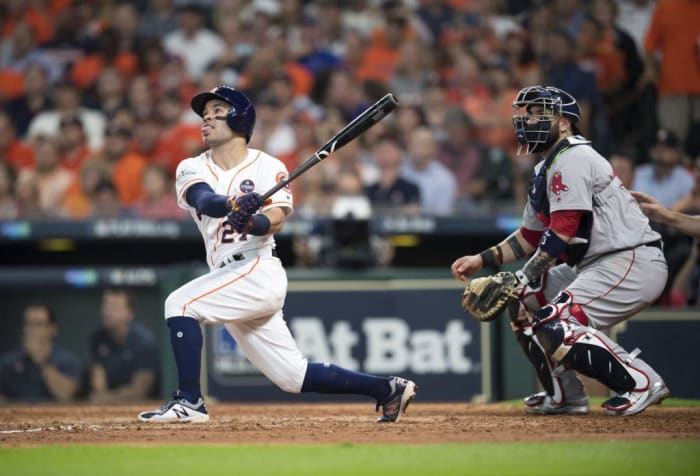
Tasked with facing off against AL strikeout king Chris Sale, MVP-to-be Altuve wasted little time in making his mark. Altuve connected for home runs against Sale in the first and fifth innings, before hitting a third in the seventh inning vs. Austin Maddox. He became the 10th player in history to hit three home runs in a postseason game.
Houston Astros: Justin Verlander, 2017 ALCS

Winner of seven consecutive starts entering the series, Verlander kept his foot on the gas in the ALCS vs. the Yankees. He turned in a 13-strikeout, complete game win outing in Game 2, before striking out eight over seven innings during a series-clinching Game 6 win. Overall, Verlander allowed one run and 10 hits over 16 innings en route to ALCS MVP honors.
Houston Astros: George Springer, 2017 World Series

Springer put on a show atop the Astros lineup against the Dodgers, serving as a constant spark plug in the most high-octane World Series of all-time. Springer hit .379 with five home runs, three doubles and 29 total bases to push the Astros to their first World Series win in franchise history. His home run and total base marks are both World Series records, with his four consecutive games with a homer to close out the Series setting a record as well.
Los Angeles Dodgers: Sandy Koufax, 1963 World Series Game 1
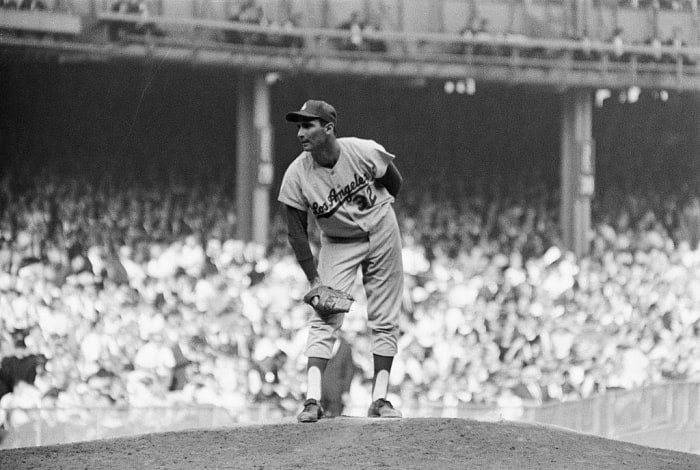
Koufax topped off a year where he turned in a 1.88 ERA and 306 strikeouts with one of the greatest postseason performances of all time. The National League’s MVP and Cy Young Award winner for the year, Koufax struck out 15 Yankees during a 5-2, complete game victory, setting a new World Series record in the process. Mickey Mantle, Roger Maris, Elston Howard and Bobby Richardson combined to go 1-for-14 with seven K’s on the day.
Los Angeles Dodgers: Sandy Koufax, 1965 World Series

Koufax made a controversial decision to open the ’65 Series, an option to skip Game 1 in observance of Yom Kippur, before returning to lose Game 2. Yet in Game 5 and the series tied 2-2, Koufax again channeled his elite form, throwing a 10-strikeout, four-hit shutout. After the Dodgers lost Game 6, he returned again on two-days rest to throw another complete game, 10-strikeout shutout in Game 7 to clinch the Series. Overall, Koufax posted an 0.38 ERA with 24 strikeouts against five walks en route to gathering his second World Series MVP.
Los Angeles Dodgers: Steve Garvey, 1978 NLCS

Although he was a 10-time All-Star with six 200-hit seasons to his credit, Garvey saved his best for the postseason, where he was a career .338 hitter over 55 games. His postseason peak came in the 1978 NLCS, where he played the biggest role in returning the Dodgers to a third World Series in five seasons. Garvey hit .389, with six of his seven hits going for extra bases, including four home runs, en route to the first of two NLCS MVP honors.
Los Angeles Dodgers: Orel Hershisher, 1988 World Series

While the ’88 Series is best remembered for Kirk Gibson’s immortal walk-off homer in Game 1, it was Hershiser who played the biggest part in the Dodger victory. After finishing the regular season with a sensational 59 consecutive scoreless innings, Hershiser continued to turn in elite level returns against Oakland in October. He threw a three-hit, complete game shutout in Game 2 to put L.A. up 2-0, before striking out nine in a Series-clinching complete game win in Game 5.
Los Angeles Dodgers: Kike Hernandez, 2017 NLCS Game 5

Hernandez had one of the greatest "out of the blue" performances in postseason history to return L.A. to its first World Series in 30 years. He connected for three home runs — including a grand slam — en route to tying the all-time postseason record with seven RBI. It sealed a seventh straight postseason win on the year for the Dodgers.
Milwaukee Brewers: Cecil Cooper, 1982 ALCS Game 5

Although Cooper struggled through most of the series (3-for-20), he came through in what would be the biggest moment in Brewers history. With two runners on and two outs in the bottom of the seventh inning, Cooper came through with a base hit into left field. Charlie Moore and Jim Gantner scored, putting the Brewers up 4-3. They held on to win the game to advance to their first — and only — World Series appearance.
Milwaukee Brewers: Ryan Braun, 2011 NLDS

2011 was the best year in Braun's career, as his NL MVP performance led the Brewers to their first division championship as a National League team. After hitting .332 with 33 home runs and 109 runs scored during the year, Braun hit .500 (9-for-18) with three doubles and four RBI to help secure the Brewers first series win since 1982.
Milwaukee Brewers: Nyjer Morgan, 2011 NLDS Game 5

One of the most colorful characters in team history, Morgan put his money where his (considerable) mouth was in the clutch. After the Diamondbacks came back from a 2-0 deficit to tie the series, the Brewers were on the ropes as the series’ decisive game went into extra innings. In the bottom of the 10th inning, Carlos Gomez singled and stole second base, and Morgan delivered a base hit into center field, scoring Gomez and sealing the series win for the NL Central champs.
Milwaukee Brewers: Mike Moustakas, 2018 NLDS Game 1

Following a July trade, Moustakas brought a considerable postseason pedigree with him to Milwaukee, which paid immediate dividends. After a furious late September comeback, the Brewers won the NL Central title in a one-game playoff against the Chicago Cubs. Game 1 of the NLDS against the Colorado Rockies went to extra innings, before a Moustakas single scored Christian Yelich to help the Brewers win their ninth consecutive game.
Milwaukee Brewers: Josh Hader, 2018 NLDS/NLCS

After a breakout campaign during the regular season, the spotlight of the postseason launched Hader’s star in full. Hader allowed five hits over 10 innings, striking out 16 against one walk over seven appearances. Deployed as both a multi-inning and situational weapon, Hader’s postseason debut was one of the greatest of all time.
Minnesota Twins: Dan Gladden, 1987 World Series (Game 1)

After hitting .350 in the ALCS, the Twins center fielder wasted little time in making an impact in his World Series debut. In the bottom of the fourth inning, Gladden delivered the biggest blow of a seven-run fourth inning explosion, connecting for a grand slam to put the Twins up 7-1. It was the first World Series grand slam in 17 years, amid a 10-1 victory for Minnesota.
Minnesota Twins: Frank Viola, 1987 World Series

In a series where the home team won every game, Viola was especially dominant at the Metrodome. He allowed one run over eight innings in Game 1, a 10-1 victory for the Twins. After struggling against the Cardinals in Game 4 in St. Louis (five runs over 3.1 innings), he slammed the door shut in Game 7. Viola struck out seven over eight innings, sealing the franchise’s first World Series win in the Twin Cities and picking up Series MVP honors.
Minnesota Twins: Kirby Puckett, 1991 ALCS
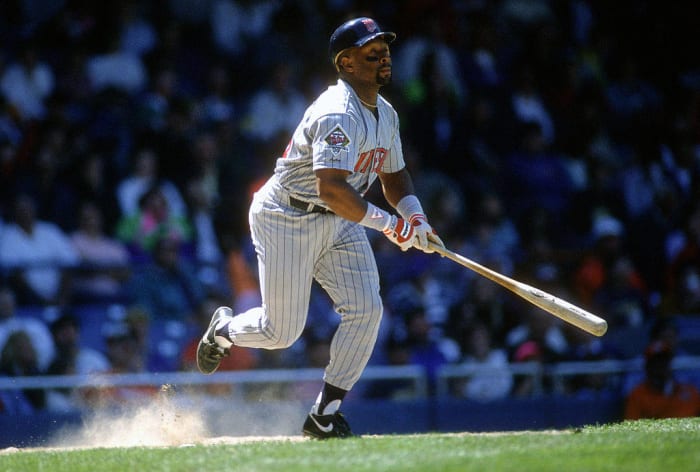
Puckett and the Twins returned to the postseason for the first time since their ’87 World Championship in 1991, and Puckett picked up where he last left off in October. Against the Toronto Blue Jays, Puckett hit .429 (9-for-21) with two home runs and six RBI, on his way to ALCS MVP honors. The Twins won the series four games to one.
Minnesota Twins: Kirby Puckett, 1991 World Series (Game 6)

On the heels of winning ALCS MVP, Puckett had the signature performance of his Hall of Fame career in Game 6 of the World Series. In Game 6, he connected for an RBI triple in the first inning, before making an incredible leaping catch to rob Ron Gant of an extra-base hit in the third inning. Puckett saved his biggest impact for last, when his 11 th inning walk-off home run broke a 1-1 tie and sent the Series to Game 7.
Minnesota Twins: Jack Morris, 1991 World Series (Game 7)

Morris had already made two strong appearances in the 1991 World Series, but his Game 7 effort is arguably the greatest in World Series history. Morris left it all on the mound, working 10 shutout innings while getting zero runs of support during any of this time on the mound. The Twins would win the game in the bottom of the 10th, 1-0, and Morris would win World Series MVP, joining Sandy Koufax as the only pitchers to ever win the honor twice.
New York Yankees: Babe Ruth, 1932 World Series (Game 3)

Ruth played in seven World Series with the Yankees, but never was he more dominant than in 1928. The Babe hit .625 (10-for-16) with three doubles and three home runs. All three homers came in Game 4 — the second such game in Ruth’s World Series career — sealing the Series sweep over the Cardinals that avenged New York's loss to St. Louis two years prior.
New York Yankees: Don Larsen, 1956 World Series (Game 5)

Larsen made two appearances in the 1956 Series, working 1.2 innings in Game 2, allowing one hit and four unearned runs. However, it is his second outing that endures as one of the most legendary in baseball history. Larsen threw the only perfect game in World Series history in Game 5, striking out seven Dodgers in the process. It was the first perfect game in 34 years and the only postseason no-hitter for the next 54 seasons.
New York Yankees: Reggie Jackson, 1977 World Series (Game 6)

It only took three at-bats for Jackson to forever affirm his status as "Mr. October." In Game 5 of the 1977 World Series, Jackson not only hit three home runs against the Dodgers, but he did so in three consecutive bats…against three different pitchers…and on three consecutive pitches. Jackson hit .450 with five home runs overall in the Series, becoming the only player in history to win World Series MVP with two different teams.
New York Yankees: Mariano Rivera, 1998-99 (all of it)

It is only right that the greatest postseason pitcher of all-time greatness appears over more than one season. Of his 96 postseason appearances, Rivera was at his most dominant in the 18 he made during the Yankees consecutive World Series wins in 1998 and 1999. Over 25.2 innings, he converted 12 saves and posted 20 strikeouts with only five walks while opponents hit just .174 against him. In 1999, Rivera won World Series MVP honors following New York’s sweep of the Atlanta Braves.
New York Yankees: Derek Jeter, 2003 ALDS (Game 3)

Some performances have massive importance but can’t be summed up by numbers alone. Such is the case with The Captain’s unforgettable "flip play," where he ran across the diamond to intercept an overthrown ball from the outfield. Not only did he cleanly field the ball, but he also seamlessly flipped it to catcher Jorge Posada, who tagged out Jeremy Giambi at the last second at the plate. It was a play that completely shifted the momentum of the series, as the Yankees would go on to win, with Jeter hitting .444 in the process.
Oakland Athletics: Gene Tenace, 1972 World Series

Although he didn’t get a hit until Game 5 of the ALCS, it made a big impact, as it drove in the series-clinching run. The World Series, however, was a completely different case, as Tenace became a bona fide threat at the plate, hitting two home runs in Game 1. After adding another two homers later in the Series, Tenace became of the most surprising World Series MVPs of all-time.
Oakland Athletics: Reggie Jackson, 1973 World Series (Game 7)

Although his Yankee postseason exploits are more renown, Jackson truly arrived as "Mr. October" in the fall of 1973. After missing the prior year’s World Series with a torn hamstring, Jackson more than made up for lost time, hitting .310 with five extra-base hits against the Mets. He hit his lone homer of the Series to put the A’s up in Game 7, as they defended their World Series crown.
Oakland Athletics: Rollie Fingers, 1974 World Series

Fingers made an impact in nearly every game of the '74 Series. In Game 1, he picked up the win after working 4.1 innings in relief, striking out three. In Game 2, he picked up a hold, before getting the save in each of the Series’ final two games. Overall, Fingers worked 9.1 innings, allowing only two runs and striking out six during Oakland’s 4-1 WS win over the Dodgers.
Oakland Athletics: Rickey Henderson, 1989 ALCS

Henderson was at his overall best during the 1989 postseason for the A’s, devastating the Blue Jays and Giants alike. He was ALCS MVP after hitting .400 with eight stolen bases, two home runs and scoring six runs in five games against Toronto. In the World Series, he improved his average to .474 (9-for-19), with three stolen bases and two triples. Overall, he hit .441 with two doubles, three triples, three home runs, 12 runs scored and was successful in 11 of 12 stolen base attempts.
Oakland Athletics: Dave Stewart, 1990 playoffs

One of the great big-game pitchers of his era, Stewart won World Series MVP in 1989. The following season, he arguably did even better work in the ALCS, when he was twice pitted against Roger Clemens and the Boston Red Sox. He outdueled Clemens in both games, with a pair of eight-inning, one-run victories, picking up ALCS MVP and pulling the A’s to second consecutive World Series appearances.
St. Louis Cardinals: Bob Gibson, 1967 World Series

Gibson’s three outings against the Red Sox in 1967 formed arguably the greatest starting pitching in World Series history. He threw three complete games (winning each of them) while striking out 26 against only four walks, earning his second World Series MVP. This came after having his leg broken earlier in the year by a Roberto Clemente line drive. Overall in his World Series career, Gibson was 7-2 with a 1.89 ERA and eight complete games.
St. Louis Cardinals: Bob Gibson, 1968 World Series (Game 1)

In a career that had numerous ones, Gibson’s greatest playoff game came as a part of the greatest pitching season in modern baseball history. After finishing the regular season with 22 wins and a 1.12 ERA, he picked up his 14th shutout of the year in Game 1 against the Detroit Tigers, a 4-0 Cardinals win. Gibson held Detroit to five hits and chalked up 17 strikeouts, a still-standing World Series record.
St. Louis Cardinals: Ozzie Smith, 1985 NLCS

Already a legend for his defensive exploits, "The Wizard" brought a potent bat with him in the 1985 NLCS as well. For the series, Smith hit .435, but it was his final at-bat in Game 5 that produced the biggest bang of his career. Smith — who had never homered in 3,009 career at-bats left-handed — sent a Tom Niedenfuer pitch over the right field wall to win the game for St. Louis. The Cardinals would win the series four games to two.
St. Louis Cardinals: Albert Pujols, 2004 NLCS

Pujols has several memorable postseason moments to his credit, such as a three-home run performance in Game 3 of the 2011 World Series and the tape measure blast against Brad Lidge in the 2005 NLCS. But his greatest of his career came in the 2004 NLCS, when Pujols hit .500 (14-for-28) with four home runs and nine RBI against the Houston Astros, sending the Cardinals to their first World Series since 1987.
St. Louis Cardinals: David Freese, 2011 World Series

Freese’s World Series Game 6 heroics rank among the greatest in the history of the game. With the Rangers up 7-5 and the Cardinals down to their last strike in the ninth inning, Freese connected for a game-tying triple to force extra innings. Two innings later, after the Cardinals had come back yet again, Freese hit a walk-off solo home run to center field to win Game 6. The Cardinals would win the Series in seven games, with Freese claiming MVP.
Tampa Bay Rays: Matt Garza, 2008 ALDS (Game 7)

In Tampa’s first foray into the postseason, the Rays transformed from a 96-loss club the prior season into American League champions the next. It was Garza who led the way on the mound, twice besting the Boston Red Sox in the ALCS. In Game 7, he held Boston to two hits over seven innings while striking out nine, sending the Rays to their first — and only — World Series appearance.
Tampa Bay Rays: B.J. Upton, 2008

Upton put his full array of skills on display during the 2008 ALCS, hitting .321 with four home runs and scoring eight runs. He went deep in Games 2, 3, 5 and 6. Overall, he drove in 11 runs during a series where the Rays scored at least nine runs in three of their victories.
Tampa Bay Rays: Evan Longoria, 2008 ALDS (Game 1)

On the heels of one of the most impactful rookie seasons in recent memory, Longoria wasted no time acclimating himself to the postseason. In the first playoff game in franchise history, he homered in his first two at-bats against the Chicago White Sox in what would become a 6-4 Tampa win. He became the first rookie and second player overall to homer in his first two postseason plate appearances.
Tampa Bay Rays: Evan Longoria, 2008 ALCS

After making an immediate impact in his first postseason series, Longoria didn’t let up in the next round. Against the Red Sox in the ALCS, four of his seven hits were home runs, while another three were doubles. Overall, Longoria drove in eight runs during the series and set a rookie record for most home runs in a postseason series.
Tampa Bay Rays: Matt Moore, 2011 ALDS

After being called up late in the 2011 season, the Rays had no hesitation about unleashing their prized prospect on the postseason. In Game 2 of the ALDS, he picked up the win after allowing two hits over seven innings against the Texas Rangers while striking out six. Factor in a three-inning relief appearance in Game 4, and Moore allowed one run and three hits over 10 innings in his postseason debut.
Washington Nationals: Ryan Zimmerman, 2012 NLDS

Zimmerman has been along for the entire postseason ride with Nats, making five postseason appearances with the club. His first came in 2012 when he hit .381 (8-for-21) against the Cardinals in the NLDS. Zimmerman had three multi-hit games in the series and homered in Games 2 and 5.
Washington Nationals: Jayson Werth, 2012 NLCS (Game 5)

Werth hit .238 overall in the 2012 NLDS, but his biggest hit of the series was a timely one. With the Nationals on the brink of elimination in Game 4, Werth took Cardinals pitcher Lance Lynn deep into left field for a game-winning/series-saving home run. It was the longest at-bat ever that resulted in a playoff game-winning hit, as Lynn and Werth squared off over 13 pitches.
Washington Nationals: Bryce Harper, 2014 NLDS

Harper’s high-octane intensity hit next levels in the Nationals faceoff with the San Francisco Giants in the 2014 NLDS. In Game 1, Harper connected for a mammoth 445-foot homer off Giants pitcher Hunter Strickland, with Harper admiring and glaring at Strickland afterward. Three games later Harper struck again, smashing a game-tying homer vs. Strickland, this one landing in McCovey Cove outside AT&T Park.
Washington Nationals: Daniel Murphy, 2017 NLDS

A year after his postseason tear with the Mets in 2015, Murphy kept his playoff hot hand going for the Nationals. He hit .438 (7-for-13) over five games against the Los Angeles Dodgers. In the process, he was walked five times but still drove in six runs and stole two bases.
Washington Nationals: Stephen Strasburg, 2017 NLDS

Injuries caused Strasburg to miss the Nats postseason efforts in 2012 and 2016, but he made up for lost time during the 2017 NLDS. Strasburg started Games 1 and 4 against the Chicago Cubs, twice going seven innings and holding Chicago to three hits. He racked up 10 strikeouts in Game 1, then 12 in Game 4, all while not allowing an earned run to cross the plate in the series. For his overall playoff career of 19.1 innings, Strasburg owns an 0.47 career ERA.
Matt Whitener is St. Louis-based writer, radio host and 12-6 curveball enthusiast. He has been covering Major League Baseball since 2010, and dabbles in WWE, NBA and other odd jobs as well. Follow Matt on Twitter at @CheapSeatFan.
More must-reads:
- MLB players who will be X-factors in the postseason
- Ranking the postseason lineups
- The 'MLB Comeback Player of the Year award winners' quiz
Breaking News
Trending News
Customize Your Newsletter
 +
+
Get the latest news and rumors, customized to your favorite sports and teams. Emailed daily. Always free!
PRIVACY POLICY EDITORIAL POLICY CONTACT US
ABOUT YARDBARKER TERMS OF SERVICE
Use of this website (including any and all parts and
components) constitutes your acceptance of these
Terms of Service and Privacy Policy.
This site is for entertainment purposes only.
There is no gambling offered on this site.
Gambling Problem? Call 1-800-Gambler.
